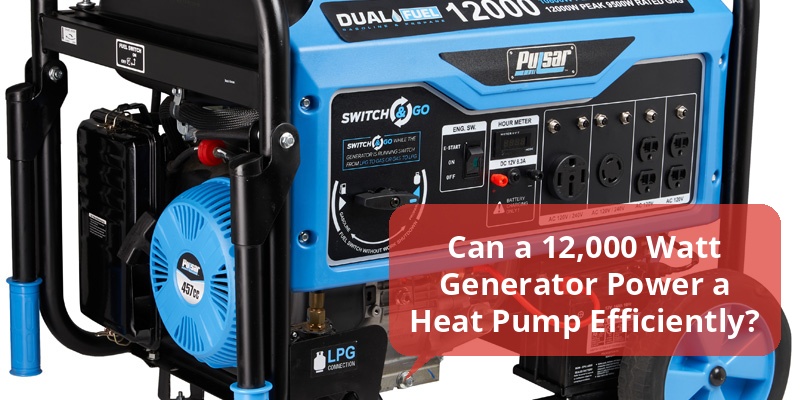Choosing the right generator to power a heat pump is critical for uninterrupted home heating and cooling, especially during power outages. A common question is whether a 12,000 watt generator can run a heat pump effectively. This article explores the power requirements of heat pumps, generator capacities, and factors that influence their compatibility to guide American homeowners in making an informed decision.
| Generator Capacity | Typical Heat Pump Power Need | Starting vs Running Watts | Compatibility |
|---|---|---|---|
| 12,000 Watts | 3,000 – 8,000 Watts | Starting: High surge; Running: Moderate | Generally Suitable with Proper Sizing |
Understanding Heat Pump Power Requirements
Heat pumps require two types of power for operation: starting watts and running watts. Starting watts are significantly higher due to the surge needed when the compressor motor kicks on. Running watts are the consistent energy the unit consumes once operational. Typical residential heat pumps demand between 3,000 and 8,000 running watts, while startup wattage can be 2 to 3 times higher.
The exact wattage depends on factors like the unit’s size, efficiency rating, and outdoor temperature. Larger heat pumps or those serving bigger homes generally need more power.
Generator Sizing for Heat Pumps
A 12,000 watt generator is considered a high-capacity portable or standby generator capable of supporting multiple household appliances simultaneously. For heat pumps, this capacity usually covers both the startup surge and running power demands effectively.
Key points when sizing a generator for a heat pump include:
- Calculate total wattage including other essential loads if running multiple appliances.
- Ensure the generator has sufficient surge capacity to handle the heat pump’s startup requirement.
- Consider factors like fuel type, runtime, and noise level for generator choice.
Starting Wattage Surge of Heat Pumps and Generator Impact
Electric motors in heat pumps can draw up to 3 times their rated running current upon startup. For example, a heat pump running at 4,000 watts may briefly surge up to 12,000 watts. A 12,000 watt generator can handle this surge if properly rated, but it leaves little margin for additional appliances.
This surge impact means:
- Generators with slightly higher surge capacity than the heat pump’s startup wattage are ideal.
- Some heat pumps have soft start technology that reduces startup wattage, easing generator demand.
- Overloading a generator can cause voltage dropouts, damaging equipment or causing shutdowns.
Additional Appliances and Load Management
Homeowners often want to run other critical appliances alongside a heat pump, such as refrigerators, lights, and medical devices. Since a 12,000 watt generator can power multiple loads simultaneously, careful load management is essential to avoid overloading.
Strategies to manage loads include:
- Prioritizing appliances based on necessity.
- Using transfer switches to isolate loads efficiently.
- Monitoring generator wattage with portable meters or smart panels.
Fuel Type, Efficiency, and Runtime Considerations
Generators come in various fuel types—gasoline, propane, and diesel—with differing efficiencies and runtime capabilities. A 12,000 watt generator running on propane provides cleaner burning but may have shorter runtime per tank compared to gasoline.
Key factors affecting sustained heat pump operation:
- Fuel availability during extended outages.
- Generator fuel consumption rates at full and partial loads.
- Regular maintenance schedules to ensure reliability.
Installation and Safety Tips for Using a Generator with a Heat Pump
Professional installation is crucial when connecting a generator to a heat pump system to ensure safe and reliable power transfer. Improper setups can lead to fire hazards, carbon monoxide poisoning, and damage to electrical equipment.
Recommended safety practices include:
- Installing a transfer switch to isolate the generator from the main power grid.
- Using properly rated and grounded extension cords or power connections.
- Placing generator outdoors and away from windows, vents, and doors to avoid CO buildup.
- Following local codes and manufacturer guidelines strictly.
Common Myths and Misconceptions
There are misconceptions that any generator labeled “12,000 watts” will effortlessly run all household devices including heat pumps. However, differences between surge and continuous wattage ratings, and the heat pump’s startup requirements, mean generator choice must be made carefully.
Other myths include:
- Generators can run heat pumps indefinitely without refueling—reality depends on fuel supply and generator efficiency.
- Heat pumps do not require surge capacity—startup wattage spikes are usually the highest load.
- Lower wattage generators can handle heat pumps with manual cycling—this risks frequent overloads and equipment damage.
Alternatives and Enhancements to Consider
Homeowners exploring backup power solutions for heat pumps may also consider:
- Battery backup systems: Combined with solar panels, these can offer quieter and sustainable power for smaller loads.
- Soft starters or variable speed compressors: These reduce startup power surge and improve generator compatibility.
- Whole-home standby generators: Larger units wired into home circuits can support heat pumps seamlessly during outages.
Summary Table: Generator vs Heat Pump Power Needs
| Parameter | Typical Heat Pump | 12,000 Watt Generator |
|---|---|---|
| Running Watts | 3,000 – 8,000 W | Up to 12,000 W |
| Starting Watts (Surge) | Up to 3x running (9,000 – 24,000 W) | Typically rated for 12,000 – 15,000 W surge |
| Typical Runtime Fuel | – | 8 – 12 hours (gasoline/propane depending on use) |
| Is Generator Suitable? | – | Yes, if no large simultaneous loads exceed total wattage |
